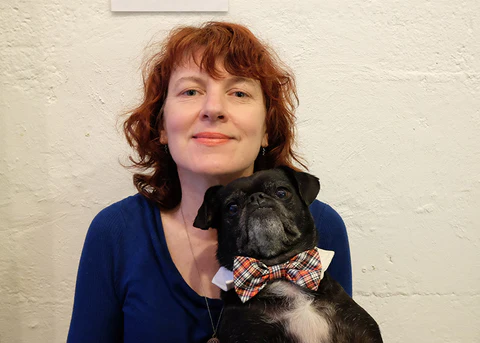Get to Know Erika Hall
Mar 20, 2018

Up next in our Meet the Authors series, Erika Hall shares her morning ritual (Rupert makes an appearance), who she’s keeping up with, what she thinks the tech industry needs more (and less) of, and some advice that’s always stuck with her.

ABA: What’s the first thing you do every morning to start your day on the right foot?
Erika Hall: My dog sleeps at the end of my bed. I poke him with my foot. He makes a grumbly sound and wriggles up to sit by my head.This is better than reading Twitter. And then I drink three cups of coffee, and ideally, get out for a run.
ABA: Is there anyone, or anyone’s work, you’re paying attention to right now?
EH: I’m a big fan of what Anna Pickard and everyone else at Slack is doing. What they have created could be described as an evolution of AIM (AOL Instant Messaging, RIP), but they infused it with fun and humanity and utility, because they are so thoughtful about the language and interactions.
Also, Jennifer Daniel. She is a fantastic, thoughtful, outspoken designer and writer who embeds nifty critiques in the stuff she creates. I loved her recent talk on emoji. She works with equal facility in words, digital, and print, and examines the arbitrary boundaries in various media.
We are in a period of tremendous upheaval and reflection right now, confronting the implications of what happens when you insert engagement-driven digital systems into billions of personal, professional, and political relationships. Especially considering the advances in machine learning, it is a great time to look backwards before looking forward again. Technology is not neutral. It manifests the values of its creators. We have the power to use these systems to improve lives, at scale, but that won’t happen automatically. It takes a lot of discipline to pass on the easy money and create something sustainable. So, I am rereading Buckminster Fuller. We need more like him, asking “How does my work benefit humanity?”
ABA: What does the tech industry need more of? Less of?
EH: The industry needs more time for reflection. We’re working on all of these systems that have huge implications. Talking through them and considering various outcomes doesn’t take that much time. And it’s more than the retrospective at the end of a sprint. We need more conversations asking “Why are we doing this thing at all” rather than stopping with “How do we do this well?” It’s now easy to make things really fast, but what are we rushing towards? Maybe stop making for a few days.
The first prototype should be a thought experiment. It’s easier to criticize an idea before time and talent have gone into realizing it. Then everyone gets consumed with the sunk cost fallacy and too precious about the wrong things. Get the team in the room and challenge the ideas.
ABA: What is your go-to source of inspiration when you’re trying to get out of a creative rut?
I go for a run. Nothing rewires my brain like a few miles through Golden Gate Park in the morning. The science backs this up, but it is freaky, like having a muse. New ideas come to me and arrange themselves in my brain. Also, talking to people is very good, and really hard to remember to do when you’re in the stuck place. Sitting down for a chat over coffee can dislodge some of the stuckness. The challenge is writing down the ideas quickly enough after either one of these activities.
Just watching the people around you go about their daily lives is fantastic. That’s why I think technology and design companies with urban offices do a great disservice to their employees by feeding them luxurious lunches onsite. It stifles curiosity. That’s an hour every day those designers, marketers, and engineers could be walking around breathing different air and seeing how the world works.
ABA: Is there a fear or professional challenge that keeps you up at night? What is it?
That despite the availability of so much knowledge about why people behave as they do, we seem powerless to change it for the better. Or rather, too many online business models are predicated on people behaving badly. Outrage is profitable, and it creates a toxic fog.
ABA: What tool, object, or ritual could you not live without to get you through a week?
Saturday mornings I bike to Garfield Pool, a public pool in the Mission District of San Francisco, and do laps for about forty-five minutes. Then I get coffee nearby and sit and read and think. I meander back through the Mission to check the gentrification index—whether any shops have closed or gaudy vernacular restaurant signs have been replaced by some sort of spare, modern lettering.
The pool is typically heated and all of the tension of the previous week disappears. I also enjoy the quality time being amongst the public. There aren’t many spaces like that where all sorts of people mingle doing a solo activity while sharing a space. It’s not really a commercial activity. Admission is $6. Just never talk to me in the locker room.
ABA: Is there a piece of professional or life advice you’ve gotten that has always stuck with you? What is it?
Tell people what you want and ask for help. Be willing to help other people in return. It’s amazing how much help you can get if you just ask. And few things feel better than helping someone else out when they need it.

